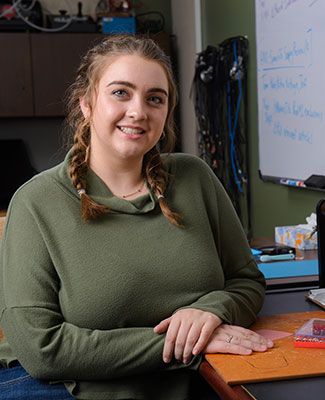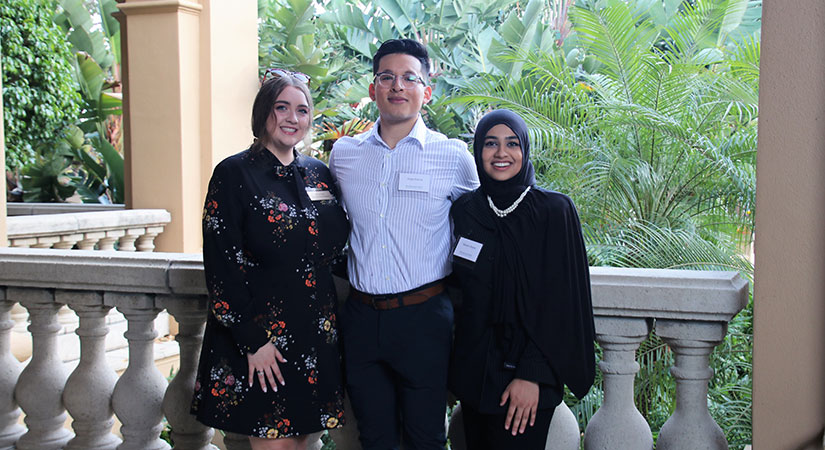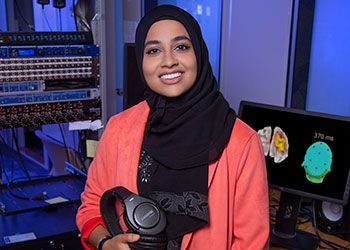2022 Winter University Featured Speaker
Alyssa Fritz shared how her role in working in an MSU Communication Arts and Sciences research lab led to success as a student.

2022 Winter University Featured Speaker
Alyssa Fritz shared how her role in working in an MSU Communication Arts and Sciences research lab led to success as a student.
February 22, 2022Alyssa Fritz is a communications senior from Frankenmuth, Michigan. She is an extremely engaged student, including as an important member of a research lab seeking to understand how speech is affected by diseases like Parkinson’s. In February of 2022, Alyssa was one of three students to present about her MSU experience for an audience of donors, alumni and friends at Winter University in Florida. Here is Alyssa’s story:
It is a beautiful day to be a Spartan here in Florida. I don’t know if you’re aware, but it is quite cold and wintry in Michigan this time of year. We had just barely missed another massive snowstorm as we arrived here in Florida, so thank you for coming to allow us to get away from the cold and into these beautiful temperatures.
I want to acknowledge that I would not be able to be as involved as I am on campus without the help of donors like some of y’all here today that sponsor our student experiences, but I specifically want to thank the Kragt family for their family’s memorial scholarship through the College of Communication Arts and Sciences. I also want to thank the staff who have worked diligently to organize this beautiful event for us.
My name is Alyssa Fritz, and I’m a senior in my final semester.
I study Communication Analytics and Research Methods, with minors in Cognitive Sciences and Communicative Sciences and Disorders – with this, I am currently in the process of applying to clinical Master’s programs in Speech Language Pathology.
When invited to speak at this event, we were asked to prepare a few remarks summarizing what our time at Michigan State University has meant for us. This led me to spend some significant time reflecting how I, a girl from a small rural mid-Michigan town, ended up here today, in front of some of MSU’s best and most distinguished alumni and friends.
To answer this, I want to preface by stating that I don’t quite know the answer, because all I have done over the past few years is engage with projects that make me excited to wake each morning, but to address why I chose MSU, I want to jump back five years ago when I decided to start bleeding green and white forever.
What really sold me on MSU compared to other undergrad institutions was the enchantment of the campus and people. MSU is home to some of the most compassionate individuals I have ever met, some of whom I have had the pleasure to meet with quite recently.
I regularly joke that I chose MSU out of spite because my family are University of Michigan fans, and although this past year’s football triumph brought incredible bragging rights, it is really opportunities like this that will always make me look back at my time at MSU in such delight.
As I begin to now look ahead towards my clinical graduate school program, I find myself looking for campuses that are reminiscent of ours – of course I mean this both in terms of physical appearance to avoid getting too homesick, but also the rigor of their academic programs and the compassion of their administration, faculty and staff towards student excellence.

My experiences have taught me that you can tell a lot about an academic program’s integrity by how much their faculty cares about student growth. The person who set this standard for me is Dr. Jeffery Searl, the professor I have done research under since my very first month on campus as a freshman. He took a chance on letting 18-year-old me with no world or clinical knowledge into his lab, and I will forever be grateful as it completely shifted my career goals and has increased my confidence to pursue a career that allows me to stay in academia.
I never would have thought getting involved with research would change as much as it did for me, mostly because when I graduated high school, I didn’t think it was an opportunity I would have at MSU. My first few weeks on campus, I had thought research was only for honors or science students. This led me to jumping on the first research opportunity I was invited to. Fortunately for me, I immediately felt at home in the lab and was able to grow into the student I am today.
This didn’t come without challenges though – I have battled imposter syndrome, a mindset where one doubts one’s own abilities, since my very first day here at MSU.
For me, this stemmed from the fact that I wasn’t a traditional STEM or honors college student. Because of this, I found myself feeling the need to constantly defend my choice in major in academic settings where it wasn’t always necessary. I was dealing with the roadblocks that I had built for myself.
After much growth over the past four years, I have come to realize that there is no concrete path in education, but instead that we hold the tools to pave our own futures – to make it what WE want it to be – when offered the proper resources to do so.
It is still the case though that some students are unaware of these resources and guidance, which has led me to working as an ambassador and advisor with the University’s Undergraduate Research and Creative Arts Office to help students from across all disciplines that have this mindset of my former self realize their strengths.
This past semester, we officially formalized a Pathways to Research program to help guide non-traditional students who all have the most to overcome in gaining this experience. This includes transfer students, student parents and other communities often left out of higher-level scholarship opportunities.
I have met with hundreds of students from these groups over the past six months of the program, all of whom vocalized the same question I had four years ago: do I even belong here?
Updating the narrative of what a student who conducts research looks like is critical to getting these students included and making them know that the work they do, even though it can often feel tedious and under-recognized, is necessary for advancing their respective disciplines and marking MSU as the top-rated research institution that it is. Whether it be the broader sciences, the humanities, or somewhere in between: scholarship is scholarship.
Stepping down from that soapbox, I want to dedicate a moment to my own work.
I study progressive neurodegenerative diseases (PNDs), a term that covers a wide list of conditions that result from progressive damage to neural systems essential to the coordination of movement and cognition of thought. Some examples include Alzheimer’s, ataxia, or Huntington’s, MS, but our lab’s focus is Amyotrophic Lateral Sclerosis, or Lou Gehrig’s disease (ALS), and Parkinson’s disease (PD).
We are looking at how much force the tongue needs to create different sounds at different points throughout the diagnosis.
We know that the weakening of the oral muscles attributed to these diseases seems to happen quickly over just a few months of the diagnosis. We also now know that the lowest level of tongue strength needed for speech is quite small, which is now helping speech therapists develop effective therapy approaches to help individuals keep their voice longer.
This work will most likely not go on to cure Parkinson’s disease, but it will work to make sure that your loved ones affected are as comfortable as possible as they go through their diagnosis.
Our work is one tiny little piece of this gigantic puzzle of understanding PNDs, but with interdisciplinary work, we can create a more holistic picture throughout the progression of their diagnosis. In the end, we will work to ensure that your loved one remains able to enjoy life for as long as possible.
I want to conclude with a note looking towards my future.
My career in speech-language pathology will hopefully include clinical rotations in end-of-life care to gain further experience with diseases like ALS and PD, but I do see myself coming back to research. Because I am from a military family, I have a significant professional and personal priority to study traumatic brain injuries' impact on communication in our active duty and veteran populations.
Over the past four years at MSU, I have danced this fine line between academic identities. It took most of my undergrad to realize that not having one single interest is more than okay, and in realms like healthcare, it’s necessary to bring a diverse expertise to the table.
Read on for Mariam Sayed’s and Jorge Flores Garcia’s Winter University presentations.
LEARN MORE about support for students by contacting the Advancement Office in your college, unit or region, or by contacting Senior Director of Development for Scholarships and Fellowships Jennifer Bertram at bertram9@msu.edu or by calling (517) 432-7330.




